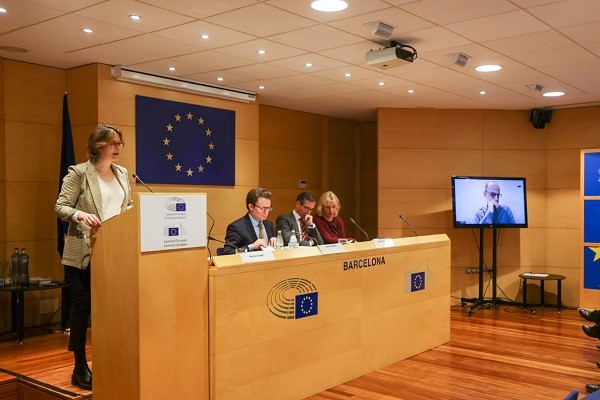- The Minister for Foreign Action and European Union took part in presenting the interactive map “Next Generation a prop teu”, promoted by the Representative Office of the European Commission in Barcelona

The Minister for Foreign Action and European Union, Meritxell Serret i Aleu, was at the presentation of the interactive map “Next Generation a prop teu”, promoted by the Representative Office of the European Commission in Barcelona with the involvement of the Government of Catalonia.
Minister Serret thanked the Representative Office of the European Commission in Barcelona for drawing up this pioneering map and expressed her conviction that it will serve to “bring European policies down to earth in the day-to-day lives of citizens”. In this respect, she asked for the commitment to “continue cooperating with administrations at all levels”, because “it has been proven that this commitment yields good results”.
“The first phase of managing NextGenerationEU funds has been a learning experience”, said the minister, who added that “we must be more agile and create complete trust to finance the projects that can achieve the renewing impact that these funds seek”.
The interactive map shows more than fifty projects in Catalonia and the Balearic Islands financed with NextGenerationEU funds. The minister underlined that “European funds allow us to respond to European and global challenges through local projects”.
Serret also stressed the “fundamental role” of the administrations closest to citizens, such as the Government of Catalonia or the local authorities, in managing NextGenerationEU funds. “We are the ones who are most familiar with the needs and projects in the territories, and we also have long-term experience in the management of structural funds”, she added. “To make the most of these funds, we must count on the collaboration of all the administrations”, she said.
During the presentation of the initiative, the director of the Representative Office of the European Commission in Barcelona, Manuel Szapiro, who welcomed the collaboration between the European Commission in Barcelona and the Government of Catalonia, explained how the map works and reviewed some of the projects it includes, mainly focused on energy and digital transformation.
The Director for Representation and Communication in Member States, Richard Kuehnel, explained that the pioneering map created in Catalonia will be extended to the rest of the territories of the European Union because it is an exercise in the transparency, visibility and added value of the NextGenerationEU funds.
Finally, Santiago Fernández Muñoz, head of the Monitoring Unit of the Recovery, Transformation and Resilience Plan of the Secretariat General for Economic Affairs and G20 of the Government of Spain, explained how this Plan is being deployed in Spain.
Catalonia and NextGenerationEU funds
Data from December 2022 show that Catalonia has been allocated 3.9 billion euros from the Recovery and Resilience Facility, the main instrument for implementing the NextGenerationEU funds. Moreover, 21.1% of the total number of calls for proposals in Spain have been obtained by entities from Catalonia.
The Catalan Government, through the Ministry for Foreign Action and European Union and the Ministry of Economy and Finance, as well as ACCIÓ, supports companies and public and private entities in the country in attracting European funds. One example is the newsletter sent out to publicise European funding opportunities.
Serret stressed the fundamental role of the administrations closest to citizens in assuring that the NextGenerationEU funds achieve the transformations proposed.
